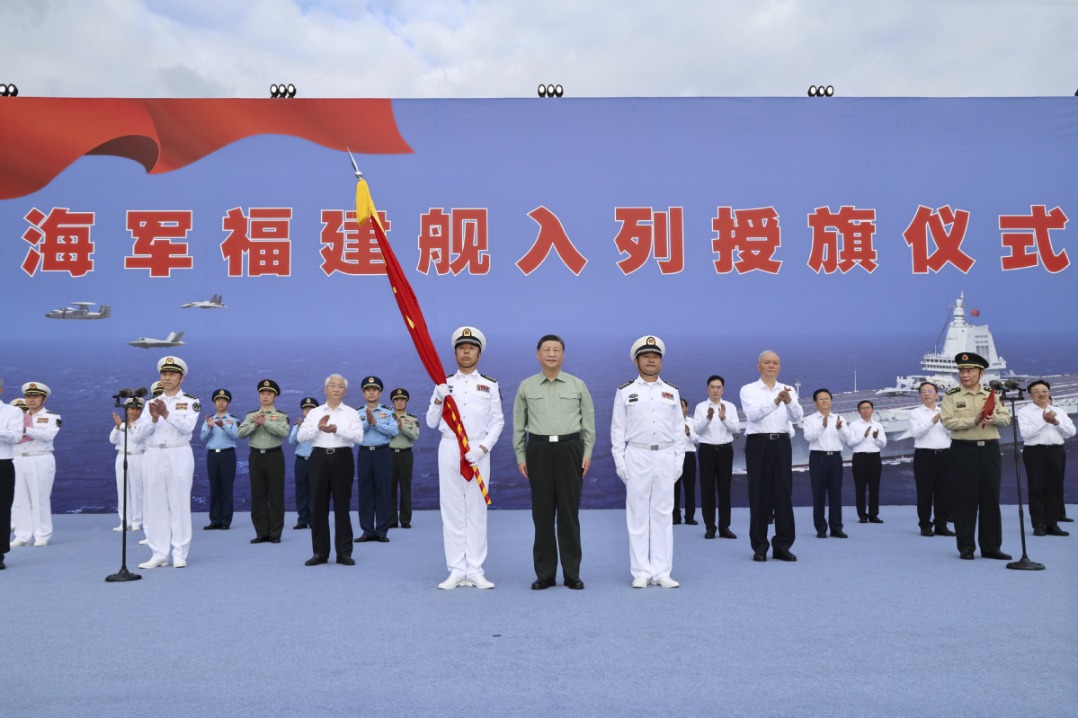China and Arab states promote BeiDou via Space Silk Road


The 5th China-Arab States BDS Cooperation Forum was recently held successfully in Zhuzhou, Hunan province. This is an important sign of new progress in scientific and technological cooperation between China and Arab countries. The globalization of China's advanced technologies has driven innovation in the Global South, and it's reshaping the global technology landscape. The large-scale application of the BeiDou Navigation Satellite System (BDS) in Arab countries provides an excellent window to observe this historic process.
The China-Arab States cooperation on BDS is an epitome of the transfer and diffusion of China's advanced technologies. As a gradual and institutionalized process, the China-Arab cooperation on BDS is determined by the development of China's technological capabilities, the progress of system construction, and the needs of Arab countries. Since 2015, the cooperation has begun with high-level visits and technical exchanges. China introduced the technical features and service capabilities of BDS, while Arab countries expressed requirements for reliable satellite navigation system. The initial effective contact and positive impression laid the foundation for the establishment of a formal cooperation mechanism. With the holding of the first China-Arab States BDS Cooperation Forum in 2017, a stable cooperation model has formed.
On one hand, the performance of BDS in Arab countries was verified through pilot projects. On the other hand, BDS products such as receivers and positioning terminals had begun to enter the markets of Arab countries through technical training and agent networks. After the completion of the BDS-3 global system in 2020, the cooperation between China and Arab states in the field of satellite navigation has developed rapidly. Starting with a few Arab countries, an increasing number of countries in the region have become users of BDS. Simultaneously, it has transitioned from initial technical trials to large-scale application. In this new era of China-Arab cooperation, joint construction of large-scale navigation infrastructure and the localization of BDS terminal products have become prominent features.
BeiDou plays a crucial role in cooperation between China and Arab States.
Satellite navigation systems are important space public infrastructures to service the globe. Various electronic devices and software systems require time and location information from satellite navigation systems to operate. Therefore, the application of satellite navigation systems is related to national security, economic development, and social stability. Arab countries are important partners of Belt and Road Initiative, as numerous cooperative projects are implemented. BDS is a core component of Space Silk Road that provides navigation, positioning, and timing services to Arab countries. The United States has waged navigation warfare in West Asia and North Africa. Through electronic jamming, the US military prevented adversaries from using the Global Positioning System (GPS) while ensuring its own access. Due to frequent signal interference, stable satellite signals have been unavailable in vast areas of Syria and the eastern Mediterranean coast since 2018 — it has severely impacted daily life in these areas. It has been proven that Arab countries should not rely solely on GPS. Security can only be guaranteed through compatibility with multiple satellite navigation systems.
BDS can be widely used and promotes economic development. In Algeria, the BDS network of Continuously Operating Reference Stations (CORS) has been established. These stations constitute the ground infrastructure for high-precision positioning and improve accuracy from meters to centimeters. In Egypt and the United Arab Emirates (UAE), BDS is widely used in the construction of smart cities in areas such as engineering surveying, machinery control, and safety monitoring. In Saudi Arabia and Iraq, BDS serves for resource exploration, safety reporting at oil fields, and emergency management in the energy industry. In Kuwait and Qatar, vehicle navigation and monitoring systems based on BDS are being used in transportation to improve efficiency and safety. It also provides location services for ship navigation and port scheduling. In Tunisia and Sudan, BDS is being combined with remote sensing, geographic information systems, and unmanned aerial vehicle for precise control of agricultural machinery, management of irrigation and fertilization equipment. These applications effectively improve water resource utilization and increase production.
The China-Arab States BDS Cooperation Forum is an innovation. Currently, there are four satellite navigation systems in the world that provide global services, the GPS of the US, GLONASS of Russia, the Galileo system of Europe, and the BDS of China. Only China's BDS has established stable and efficient cooperation mechanisms with all Arab States by this forum. Particularly, the China-Arab States BDS/GNSS Cooperation Center was established in Tunisia. Through product promotion, training courses, and seminars, China has cultivated a group of policymakers, engineers, and technicians in the field of satellite navigation for Arab countries by this Center. This is the basis for sustainable development of BDS in Arab states.
In the future, there are both opportunities and challenges for China-Arab States cooperation on BDS. As an advanced technology, BDS is an important part of the China-Arab States Cooperation Forum. The ecosystem, standards, and innovation are important directions. First, it is necessary to establish a localized technology ecosystem. Based on commercial cooperation, the application of BDS will move from technology trade to joint research. The localization of terminal equipment production, software development, and system integration services could create a service networks and application industry chain of BDS in Arab states. Second, the standardization of the technology system is needed. The significant differences in technical standards for satellite navigation products among Arab countries have hindered the larger scale application of BDS. Regional and universal technical standards should be made for product certification and import and export testing. Third, technological cooperation in emerging fields should be carried out. The application of BDS is only limited by imagination. Joint research should focus on emerging fields such as smart cities, autonomous driving, and the low-altitude economy — expanding the application scenarios of BDS.
The Cooperation of BDS represents the strategic partnership between China and Arab countries, and it has become a model of global South technology cooperation under the Belt and Road Initiative. From initial technical exchanges to current comprehensive cooperation, the partnership of the Space Silk Road demonstrates the contribution of China's advanced technology to the development of the Global South.
With the development of cooperation, the BDS will effectively promote the economic diversification and social digital transformation of Arab States. It will take action as advanced technology to build a China-Arab community with a shared future.
The author is assistant professor of Beijing Foreign Studies University.
The views don't necessarily reflect those of China Daily.
If you have a specific expertise, or would like to share your thought about our stories, then send us your writings at opinion@chinadaily.com.cn, and comment@chinadaily.com.cn.


































